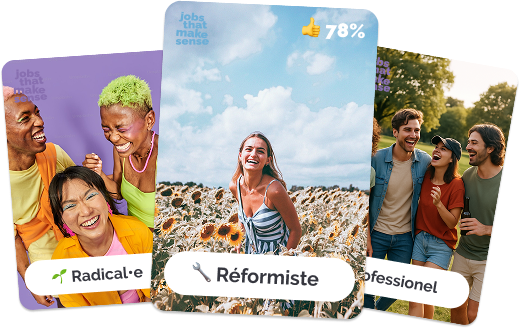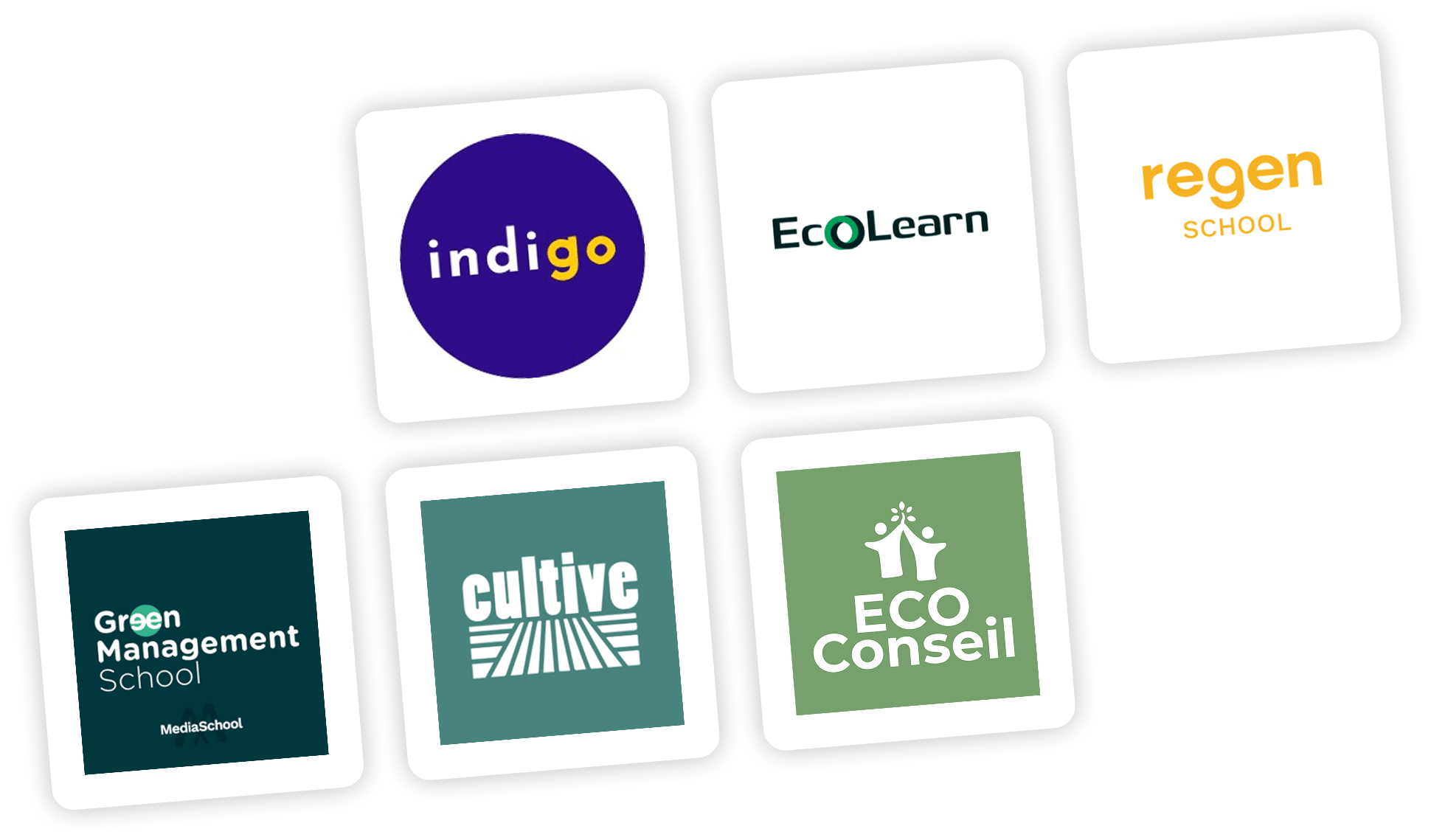How do you find a job that makes sense ?
Don't feel comfortable in your job? Not at your place in your job? Are you having doubts about your professional future? Does the meaning of work mean anything to you?
According to a 2022 survey conducted by Audencia and jobs_that_makesense, 92% of working people are looking for meaning in their jobs. A feeling of usefulness, recognition, alignment with one's values, impact... What we put behind the quest for meaning is specific to each individual. So what is a meaningful job? How do you find a job that's meaningful to you? What are some examples of meaningful jobs in 2023? Let's take a look at it together.
What is meaning at work?
Meaning at work can come in many forms. What makes sense to you won't be the same as what makes sense to your colleague Jean-Michel. That's why imitating your neighbor to find answers to your quest for meaning won't do you much good. In the Audencia survey, meaning at work meant for some a sense of purpose, for others the need to have impact, a sense of personal fulfillment or alignment with one's values. The desire to contribute to the challenges of ecological and/or social transition to give meaning to one's profession was also expressed by 57% of respondents.
A Canadian study "Meaning of Work, Mental Health at Work and Organizational Commitment", adds other dimensions to meaning at work, such as moral rectitude: you may find it important to be in an environment that values justice and fairness, in a healthy environment, where you can rely on your colleagues in times of trouble. The study also highlights recognition at work, the opportunity to achieve pro and personal goals and grow, autonomyand workplace relationships, which help develop complicity between colleagues.
Why is meaning at work important?
Bore out, brown out, burn out... The lack of meaning at work can create a few problems!
Bore out is boredom, which if it lasts, can affect mental health. Brown out, is the feeling of having no meaning, which can result in demotivation and psychological exhaustion. Burn out is the result of stress at work. This stress can be caused by a number of factors, and can also lead to a feeling of exhaustion. It is therefore important to look for a job that makes sense to you, according to what makes sense to you, in order to feel aligned at work and avoid these psychological risks.
What does meaning at work mean to you?
Now that you've had a briefing on several factors that help you find meaning at work, maybe you can identify what's important to you?
Let us guide you! Here are a few questions for you:
- How important is it for your work and skills to be recognized?
- If making an impact and feeling useful is important to you, how does that play out at work? Do you need your missions to have an impact? Do you need the positive impact to come from the mission of the organization you work for? Or both at the same time?
- How do the relationships you have at work (with your superiors, colleagues, customers) affect your motivation and efficiency?
- Taking on responsibility, making decisions... these are the things that make you tick?
- What do you mean by success?
- What brings you satisfaction at work?
- What, on the contrary, is blocking you? Demotivating you?
- What's your dream job? Why or why not?
3 exercises to find a meaningful job
There are several tools you can use to get to know yourself better. Here are 3 that may help you identify a career that matches your aspirations.
The MBTI
To help you get to know yourself better, the MBTI is a great personality test! It allows you to better understand how you function, what your strengths, weaknesses and motivations are. Undertaking introspection using a tool like the mbti can also help you better define your professional project, as part of a career transition for example. Finally, developing a better understanding of yourself makes it easier to show your personality and needs to others, particularly at work, and thus improve your working relationships.
It consists of 60 questions and allows us to determine 16 psychological personalities. Are you curious about yours?
👉 To learn more about MBTI and take the test, you can also read our dedicated article!
The Ikigaï
Often used duringprofessional assessments, the Ikigaï is a tool for getting more answers about you, what drives and motivates you. Ikigaï has 4 components:
For each of them, you can ask yourself some questions:
What you like
In your current professional life, do you like what you do? What do you like about what you do at work?
What you're good at
When do you receive positive feedback in your job or in your personal life? What services do people call on you for?
What the world needs
What are the current issues that affect you? How can you integrate what the world needs into your work environment?
What you get paid for
How much do you need to live the way you want to?
👉 To find out more and get the full set of questions, you can read the article dedicated to the Ikigai.
Skills assessment
To help you understand what makes sense for you at work, you can also undertake a skills assessment. These days, there are a number of structures that organize 3- to 6-week assessments, in both individual and group sessions! You'll often find a section on introspection, exploration to get out of your comfort zone and test yourself in new ways, and finally, the development of avenues for your new professional project. Assessments are often undertaken to help you change jobs or career direction, as they enable you to take stock of your career path and your needs!
What's more, you don't have to break the bank, because you can finance a skills assessment: via Pôle Emploi for jobseekers, Opco or the Compte Personnel de Formation (cpf).
💡To build a career plan that makes sense for you, you can also turn to coaching!
👉 Here's a full article to find out more about skills assessments.
20 examples of meaningful jobs
And to finish on a high note, here are some examples of jobs that make sense. We've selected them for their social and societal benefits, and their contribution to the ecological transition. Whether you're looking for your first job or want to change your career path, here are 20 inspiring careers!
⚠️ But beware: working conditions are just as important as the impact of the job itself... That's why, in addition to this list of high-impact jobs, it's important to identify the working environment, values and relationships that are important to you, so you can choose a job that makes sense for you!
1/ Carbon footprint consultant
Being a carbon footprint consultant means that you help companies to quantify their C02 emissions and propose an action plan to reduce them.
👉 If you're interested, there's a short course from Blue Eco Formation on the subject.
2/ Energy renovation business manager
There are many different careers in energy renovation. One of them is to help your customers save energy. Advising private customers, supporting contractors and workers on building sites and checking the quality of materials with suppliers are all part of the job.
3/ Responsible purchasing and sourcing
It's perfectly possible to pursue a career in purchasing while integrating a responsible approach! In addition to your traditional purchasing tasks, you can integrate environmental issues into your practice.
👉 Here is responsible purchasing training.
4/ Processing technician
If you'd like to organize the collection and diagnosis of recycled objects and materials, the job of recycling technician could be for you. Depending on the job, you may also be able to choose the transformation processes for items that can't be reused as they are. You could work in a recycling center, for example.
👉 If you're looking for a career change in this area, you can take a training course at Prinec or la petite rockette..
5/ Cycle mechanic
In this job, you assemble, overhaul and repair all types of bikes: city bikes, racing bikes, mountain bikes, VTCs and electric-assist bikes;
👉 Here's Make's cycle mechanic training HERE.
6/ Responsible communications manager
If you want to help organizations create content in line with their CSR strategy.
👉 Here's Lucie agency's training in responsible communication.
7/ Eco-designer
In this job, which you can do in a wide range of sectors, you study a product or service based on a global approach to its impact on the environment: air, soil, water, noise, raw materials used, energy required, waste. You take into account the product's entire life cycle;
👉 To learn a new trade, you can train in eco-design with Indigo.
8/ Sustainable mobility consultant
If you want to help companies or local authorities implement new mobility solutions for their employees or citizens, you can manage and produce the assignments entrusted to you, and provide expertise in terms of mobility management.
👉 For example, you can follow the MSc Environmental Strategy and CSR Management at IET.
9/ CSR consultant
To advise organizations on the implementation of their CSR strategy.
👉 You can strengthen your skills on the subject with Ecolearn.
10/ Renewable energy engineer
If you have an engineering background, you can specialize in renewable energies to contribute to the energy transition. You could work on biomass, wind, hydro, solar or geothermal projects.
👉 You can take Audencia's Specialized Master in Energy Transition.
11/ Craft trades
To regain a sense of purpose, some professionals choose to retrain for a career in the crafts. There are many outlets in the crafts: carpentry, welding, baking... Working with your hands brings a concrete dimension to your job!
👉 Make ICI offers training for this type of profession.
12/ Eco-host
If you want to meet people in the field, listen to them and mobilize them around environmental issues, you could also consider a job in outreach or awareness-raising.
👉 Here's a short professional training course to develop your facilitation skills.
13/ Social and solidarity worker
As we saw during covid, healthcare professionals and social workers are essential professions. Home help, carers, care assistants, national or international solidarity... the professions are numerous.
👉 To find out more about the diversity of professions, here's a dedicated article on the subject.
14/ SSE professional
SSE refers to social and solidarity-based enterprises. It brings together a diversity of organizations aligned on founding principles such as the pursuit of collective utility, reinvestment of profits in the structure and democratic governance.
15/ Biodiversity project manager
Your job is to minimize the negative impact of human activity on the natural environment during a development project.
👉 You can train for this job via ISE.
16/ Responsible digital project manager
Do you want to work in IT? To make their transition, many organizations will need to implement a more carbon-neutral and virtuous digital strategy. This can range from the choice of hardware to the entire technological management process (videoconferencing, cloud, e-mail, etc.);
👉You can train for this profession via dedicated training at centre de formation Lucie.
17/ In charge of fundraising for an association
All associations need funds to operate. Fund-raising and fund-raising managers are therefore essential to their smooth operation.
👉The Regen School curricula can train you to develop these kinds of skills.
18/ Organic market gardener
Of course, not everyone can change their life to set up and develop a business. It takes time, and you have to be able to do it financially. Still, it's a profession with a future in terms of ecological transition, and one towards which people in retraining are heading, like Louis, a former engineer.
18/ Organic market gardener
Of course, not everyone can change their life to set up and develop a business. It takes time, and you have to be able to do it financially. Still, it's a profession with a future in terms of ecological transition, and one towards which people in retraining are heading, like Louis, a former engineer.
19/ Marketing manager in an association
Marketing is useful everywhere, in every business sector and even in SSEs, NGOs and associations! If you want to develop your career in your field, you can develop your impact skills.
👉 To add a brick to your marketing training, you have Lucie's CSR training courses, for example.
20/ Sales representative in a positive-impact structure
The same goes for sales positions. To sell ethical clothing, organic cosmetics, local soups or electric bikes, companies need salespeople!
👉 Today, business schools dedicated to these professions exist, like Klima School.
Further information
👉 The 32 professions recruiting for a career change in impact.
👉 How to finance a skills assessment?
👉 5 possible ways to align your work with your values.
Taking action
👉 Find a job with a positive impact.
👉 Training for jobs in the ecological and social transition.



